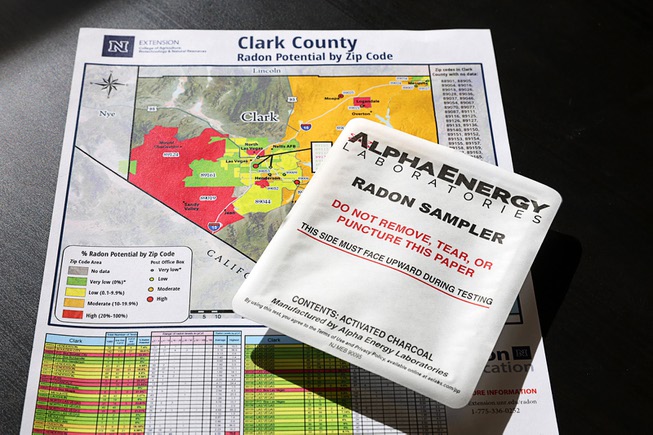
A radon test kit is shown on a map of Clark County showing radon potential by zip code at the Local Realty office Thursday, Jan. 11, 2024. The red color indicates a high potential for radon exposure.
Monday, Jan. 22, 2024 | 2 a.m.
A program to make people aware of the dangers of potentially cancer-causing radon gas in homes enlists real estate agents to distribute testing kits to their clients.
But getting those clients — especially sellers — to use the kits can be a hard sell, one Las Vegas real estate agent said.
That’s because once a seller is aware their home has elevated levels of radon, they are required by law to disclose that information to potential buyers. And the fix can cost thousands of dollars.
“They’re not looking for more issues that they’d have to disclose,” said Mark Perry, an agent with Local Realty.
Perry and his fellow agents took a class on radon in September and signed up to distribute the testing kits to their clients.
Perry said he offers the tests to homebuyers and sellers alike, but sellers rarely take him up on it because of the disclosure law.
Most home sales include a notice informing buyers about the dangers of radon gas, but as a small blurb in the paperwork, it doesn’t leave much of an impression, Perry said.
“If it was known by a seller that (radon) was elevated, or if the buyer wanted to do a test during their due-diligence period, we could ask the seller to make the necessary fixes so it wasn’t an issue,” Perry said.
Under the UNR Extension’s Nevada Radon Education Program, nearly 41,000 tests have been conducted statewide, and 7,961 have come back with elevated levels of radon, officials said.
Radon is the second-leading cause of lung cancer in the U.S., behind smoking, and responsible for about 21,000 deaths a year, according to the Environmental Protection Agency.
“If something is really causing that many deaths per year, we should probably take it a little bit more seriously than we have in the past,” Perry said.
When the natural uranium in rocks and soil decays, radon is the naturally occurring, radioactive gas left behind.
It only becomes dangerous when it seeps into enclosed spaces and becomes a concentrated pocket of radiation.
The EPA recommends mitigation for houses with 4 picocuries per liter or more of radon gas. A picocurie — one trillionth of a curie — is a measurement of radioactivity.
Nevada is one of 17 states where no counties or cities have adopted building codes to mitigate radon, according to the EPA.
Some homebuilders install pipe systems that vent radon, but for the most part, the risk is just as high for Nevada homes built over a century ago as it is for new construction.
UNR data shows more positive test results in Northern Nevada than Southern Nevada, but that probably is a reflection of a disparity in testing, Perry said.
“I think the problem is that not very many people have tested, and agents aren’t telling their sellers to test before they put it on the market,” Perry said. “And so there’s not really a history of it yet.”
Chris Kelly, who took over the Nevada Radon Education Program four years ago, said boosting awareness and testing in Southern Nevada is a priority.
“If people don’t know about radon causing lung cancer and why they need to test, then they’re not going to do it,” Kelly said.
The home tests consist of a container of activated charcoal with a paper backing. The charcoal absorbs radon as the packet is left out for two to four days. Each test comes with a prepaid package addressed to a Texas lab that reports the results.
If a test turns up an elevated level of radon gas, a lengthier test followed by possible mitigation are recommended.
Pinnacle Construction Consultants is one of the few companies licensed by the EPA’s National Radon Proficiency Program in Nevada.
Co-founder Norman Denny said he’s used to talking down panicked homeowners who have just received initial test results requiring further action.
“There’s no need to spend money on a system if you don’t need to. Do a nine-month test and then after that, if your yearly average is over 4 (picocuries per liter) per day, then give us a call and we’ll help you out,” Denny said.
The mitigation process, called sub slab depressurization, costs between $2,700 and $3,700. That price increases to about $4,700 if Denny’s workers have to travel to Southern Nevada. There are no companies certified in mitigation outside Northern Nevada.
Denny said he suspects there aren’t more radon certified contractors because the seven-hour test required for the certification is so difficult.
“That certification test is five times harder than any contractor test I’ve ever taken,” he said.
[email protected] / 702-948-7836 / @Missmusetta

